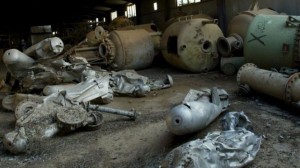
Pentagon withheld information about decades-old chemical weapons during Iraq War, report claims
American troops were exposed to chemical weapons multiple times in the years following the 2003 invasion of Iraq, while the Pentagon kept their discoveries of the expired or degraded weapons secret from investigators, fellow soldiers, and military doctors, according to a published report.
The New York Times reported late Tuesday that American troops reported finding approximately 5,000 chemical warheads, shells, or aviation bombs in the years following the 2003 invasion of Iraq. On at least six occasions, soldiers were wounded by those weapons, which had been manufactured before 1991. In all, the paper reported that 17 U.S. soldiers and seven Iraqi police officers were exposed to chemical agents during the war. The U.S. government said its number was slightly higher, but did not release a specific figure.
The paper reported that most of the agents were discovered around the Muthanna State Establishment northwest of Baghdad, which had been a center of chemical weapons production in the 1980s. The complex has been held by Islamic State militants since June. The Iraqi government told the United Nations that approximately 2,500 chemical rockets remained on the grounds of the facility when it had fallen to the militants.
In the months after the 2003 invasion, The Times reports, the Pentagon first made searching for chemical weapons a lower priority in the midst of attacks from insurgents, then withheld data from high-level investigations, including the Iraq Study Group in 2004 and the Senate Select Committee on Intelligence in 2006. During the latter investigation, the paper reports, U.S. soldiers discovered more than 2,400 chemical rockets, some containing sarin gas, at a former Republican Guard compund. All appeared to have been buried before the first Gulf War in 1991.
As late as 2010, Iraqi troops were discovering chemical weapons that appeared to have been collected elsewhere by U.S. or Iraqi army units and had not been secured properly, according to The Times. The ultimate responsibility for locating, securing, and destroying the weapons was to fall to Nouri al-Maliki’s Iraqi government. The paper reports that a plan was drafted to entomb the Muthanna site in concrete, but the remains of the facility were overrun by Islamic State before the plan could be put into action.
The Times also reports that as the U.S. stay in Iraq dragged on, doctors became less aware of how to treat wounds sustained by chemical weapons. Military officials reportedly attributed the soldiers’ wounds to conventional weapons or other factors to prevent acknowledging the discovery of pre-1991 chemical weapons. In one case, a wounded soldier who suffered burns and blisters due to mustard gas was presented with a Purple Heart by former Secretary of the Army Peter Geren. Weeks later, he was told that he had been denied the medal because the Army had determined that his wounds had not been suffered in enemy action.
The Army reportedly admitted to The Times that it had not followed its guidelines for treating soldiers exposed to chemical weapons in the years following the invasion. It vowed to identify troops and veterans who had been exposed and follow up on their cases.
SOURCE: Fox News




